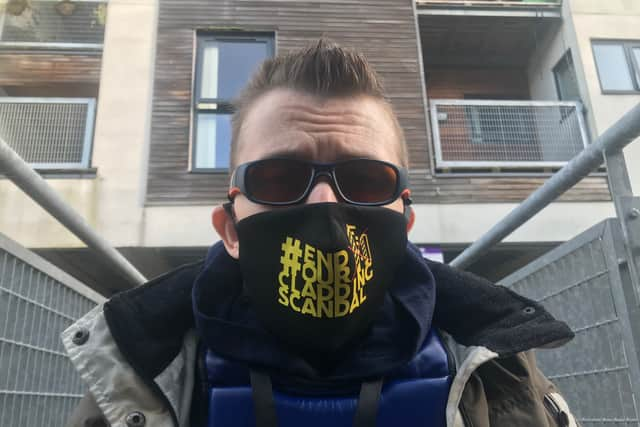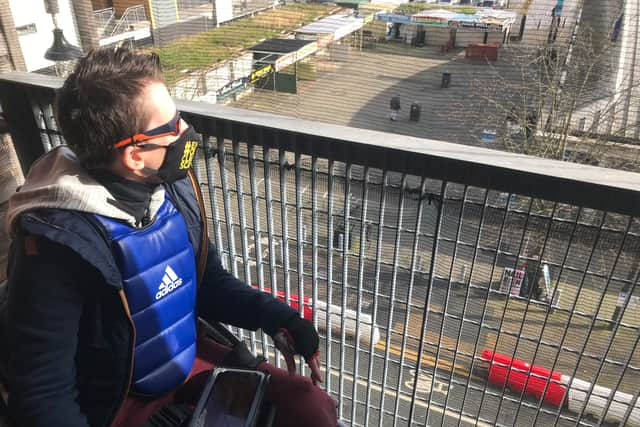Grenfell Inquiry: disabled campaigners get legal permission to challenge Government’s fire evacuation plans
and live on Freeview channel 276
Disabled campaigners have secured permission from the High Court to challenge the Government’s failure to implement evacuation recommendations made post-Grenfell.
Georgie Hulme and Sarah Rennie, co-founders of disabled leaseholder action group Claddag, initially launched legal action against the Government to ensure disabled people can safely evacuate from high-rise blocks of flats in the case of an emergency.
Advertisement
Hide AdAdvertisement
Hide AdThis came after the Home Office and then-Home Secretary Priti Patel revealed in April that they would not introduce personal emergency evacuation plans (PEEPs) for residents who might find it difficult to “self-evacuate”, despite advice given in the Grenfell Tower Inquiry. The decision was made on the grounds of “practicality,” “proportionality,” and “safety”.


But the High Court has now given Claddag permission to seek a judicial review against the decision, telling the group’s founders, both wheelchair users, that they have an “arguable” case.
Ms Hulme, 43, told NationalWorld: “This provides us with a chance to fully hold the Government to account. The decision made is beyond disgraceful. It’s not only discriminatory, but also disrespectful to those who died, survived and are bereaved due to the Grenfell Tower fire.
“It demonstrates that those who need support to evacuate in an emergency are deemed as being worth less.”


Advertisement
Hide AdAdvertisement
Hide AdMs Rennie, 36, lives in a tower block in Birmingham. When she bought her flat she was told the lifts were constructed to firefighting standards and could be used in an evacuation. But after Grenfell, it was revealed that her building has unsafe cladding - and the lifts are not safe to use.
“Our homes are death traps,” she summarised.
Meanwhile, Ms Hulme, who has Chronic Pain Syndrome, Irlens Syndrome, and adult onset Tourette’s Syndrome, lives in a mid-rise block in Manchester. The building has fire safety issues relating to its cladding, balconies, and poor compartmentation.


She said that the stress of the situation, and the constant conversation about a situation so “terrifying” for disabled residents, has had a detrimental impact on both her mental and physical health. It’s meant she’s had to increase her medication, go to extra health appointments, and attend specialised therapy.
The duo’s campaign work, which has seen them attend meetings with councils, Fire and Rescue Services, and the Government (at consultation workshops), has also started to take its toll.
Advertisement
Hide AdAdvertisement
Hide AdMs Hulme explained: “Being disabled means you have to fight for everything. This battle is just more evidence that the Government doesn’t care, [because] we aren’t viewed as ‘productive’ members of communities.
“It took a devastating fire where so many lives were lost for this all to come to light. And over five years after Grenfell, people are still having to fight for the right to equality in fire safety. It should never have come to this.”


Seventy-two people, including 15 of Grenfell’s 37 disabled residents, tragically died in the fire on the night of 14 June 2017.
The Home Office previously told NationalWorld: “The Grenfell Tower tragedy must never be allowed to happen again. The Department for Levelling Up, Housing and Communities has apologised for its past failures in its oversight of building safety - and they continue to support the inquiry throughout its investigations to help get to the truth.
Advertisement
Hide AdAdvertisement
Hide Ad“Our fire reforms will go further than ever before to protect vulnerable people as we are determined to improve the safety of residents whose ability to self-evacuate may be compromised.”
The spokesperson continued: “Our response to the Personal Emergency Evacuation Plans (PEEPs) consultation makes clear the substantial difficulties of mandating PEEPs in high-rise residential buildings, especially around practicality, proportionality and safety.”


Ms Rennie however argued that the only way to achieve “safety” is through evacuation plans - and said she has proved that creating PEEPs is entirely achievable. When she discovered the safety issues in her building, the 36-year-old managed to acquire an evacuation chair (and hire a personal assistant trained to use it) that will enable her to escape from her home if there is an emergency.
“I created this plan myself, so I’ve proved it’s possible,” she commented.
Advertisement
Hide AdAdvertisement
Hide AdMs Hulme also added that it was traumatic for their lives “to be discussed as not being proportionate to something like an evacuation chair.”


The judge who heard Claddag’s application has also capped the group’s legal fees, as the case was considered one of “public interest”. This means if they lose the case, they will only have to pay the Home Office’s legal fees up to the sum of £20,000.
Considering this is still a significant figure, they are crowdfunding to gather the rest of the money ahead of the court date - which is expected to be by the end of the year.
“We hope this fight will finally end and be won,” Ms Hulme said. “Disabled people deserve to feel safe.”
You can donate to Claddag on their website.
Comment Guidelines
National World encourages reader discussion on our stories. User feedback, insights and back-and-forth exchanges add a rich layer of context to reporting. Please review our Community Guidelines before commenting.
